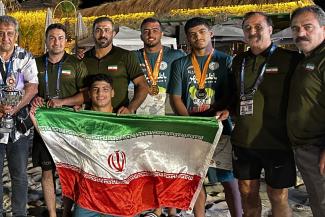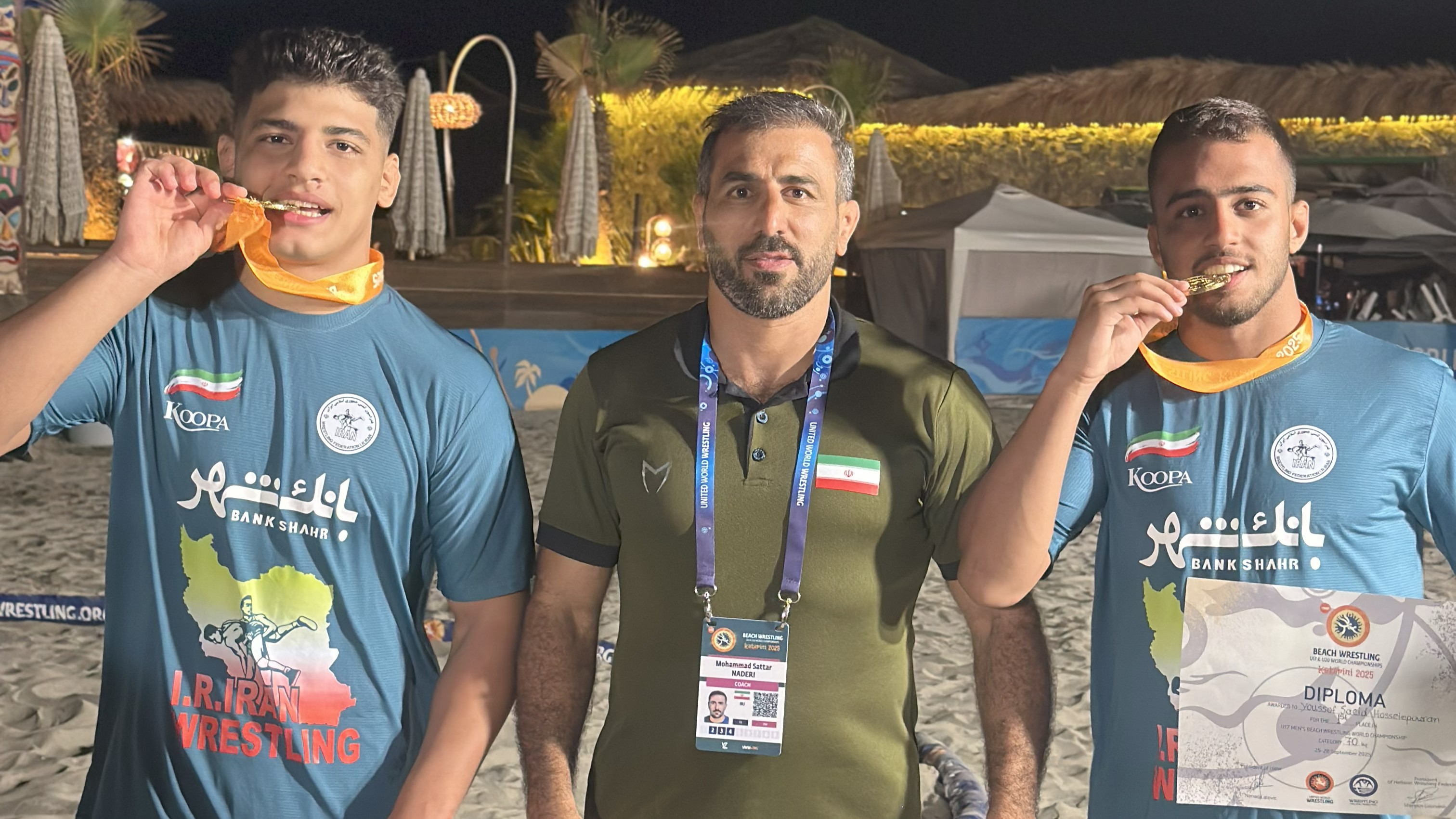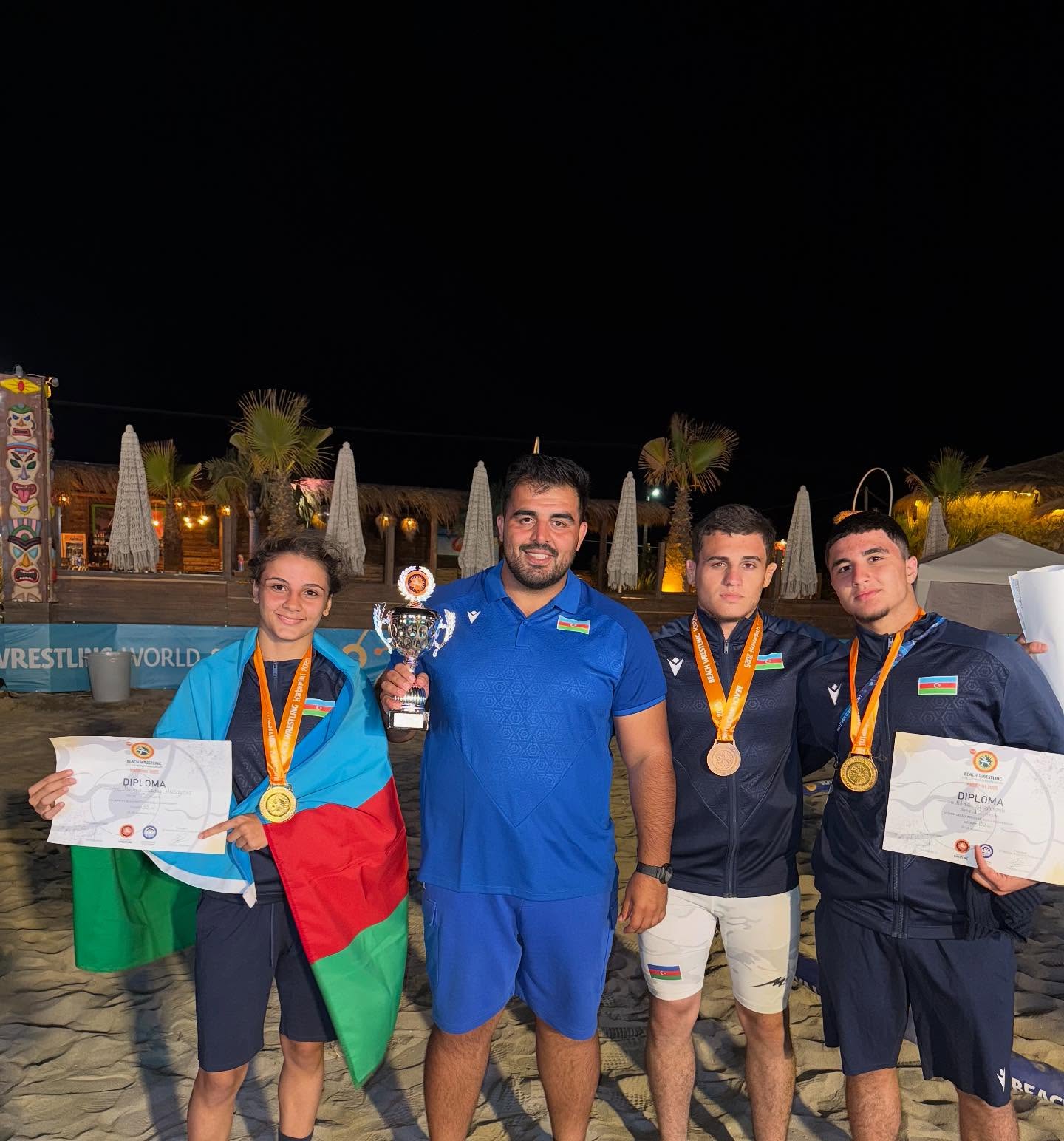UWW Awards: Sadulaev, Burroughs, Otoguro Among 10 FS Wrestlers Awarded $10,000
Monday, November 29, 2021 - 10:45 By Vinay Siwach

CORSIER-SUR-VEVEY, Switzerland (November 28) -- After a forced delay of two years, United World Wrestling's end-of-year awards are back.
For the first time, wrestlers of all three styles and 30 weight categories will receive prize money with the top-ranked wrestler getting $10,000 followed by $7,000 for the second-placed wrestler and $3,000 for the third-ranked wrestler. Previously the Ranking Series award allocation went to the top three overall point-getters in each style.
Making a significant jump from the 2019 prize money, which was around $200,000, the UWW Bureau approved a generous $600,000 prize package at the beginning of the season.
The 2021 prize money combines the amount that was reserved for 2020 but was not distributed due to the impact COVID-19 had on the competition.
This season was unlike any other with Olympics and World Championships in the same year apart from the other ranking events which allowed wrestlers to collect ranking points. The point distributions are unchanged for all events except the Olympic Games, where medalists earned 20 percent more than they did for performances at the 2021 World Championships. All Tokyo Games gold medalists will get 10 additional points, silver will get 6 additional points and bronze will be awarded 3 additional points.
For the convenience of the fans, here's a breakdown of how the points are distributed.

57kg
Thomas GILMAN (USA) 86 points
Zavur UGUEV (RWF) 68 points
Ravi KUMAR (IND) 64 points
The top three wrestlers at 57kg won medals at the Tokyo Olympics. But only Thomas GILMAN (USA) participated in the World Championships in Oslo and overtook Olympic champion Zavur UGUEV (RWF) and silver medalist Ravi KUMAR (IND) to take home $10,000.
In the 2021 season, Gilman participated in only two ranking events – Olympics and Worlds – and collected 26 (15 + 3 + 8) points from Tokyo for his bronze medal and 60 (50 + 10) from Oslo for his gold medal. His combined 86 points were 18 more than Uguev and 22 more than Dahiya.
Uguev only participated in Tokyo and captured 68 points with his gold medal performance. Dahiya's silver in Tokyo gave him 44 points while his gold at the Asian Championships in April added 20 more to his account.

61kg
Abasgadzhi MAGOMEDOV (RWF) 80 points
Daton FIX (USA) 40 points
Adlan ASKAROV (KAZ) 38 points
For Abasgadzhi MAGOMEDOV (RWF), winning the continental and the World titles was enough to ensure him the top spot at 61kg. His 80 points from the two events put him in the front as silver medalist in Oslo Daton FIX (USA) only had 40 points.
Magomedov got 60 points from the World Championships, adding to the 20 that he had accumulated by winning the gold at the European Championships.
"Before the World Championships, I was second and my coaches had told me that there is some ranking system for the end of the year," Magomedov said. "It's good news that I will get this big amount and I appreciate it."
The Russian champion has not thought about what he will do with the prize money but hopes to use it to buy an apartment.
"I have been saving to buy an apartment and I can add this money to the savings as well," he said.
For third place, Adlan ASKAROV (KAZ) participated in four events in the year with gold in Matteo Pellicone, silver at the Asian Championships and a fifth-place finish at the Poland Open. He could not get any points in Oslo.
He got 14 points in Rome, 16 points in Almaty and 8 points in Poland, making it 38 points for him, six more than fourth-placed Ravinder DAHIYA (IND).

65kg
Takuto OTOGURO (JPN) 88 points
Zagir SHAKHIEV (RWF) 80 points
Bajrang PUNIA (IND) 58 points
Olympic champion Takuto OTOGURO (JPN) and world champion Zagir SHAKHIEV (RUS) take the top two spots at the 65kg rankings while bronze medalist in Tokyo Bajrang PUNIA (IND) is third.
Before the Tokyo Games, Otoguro had 20 points for winning the gold at the Asian Championships but by winning in Tokyo, he add 68 more points and climbed up to the top spot with 88 points.
"I was aware of the ranking system but wasn't sure that I will get this prize money," Tokyo Olympic champion Otoguro said. "I am happy to win it and I will use this fund to prepare for the next tournament."
Punia was in the second spot but decided to skip the '21 Worlds and Shakhiev, who won gold in Oslo, leapfrogged him for the second spot. The RWF wrestler got 60 points from Oslo, adding to the 20 he was awarded for winning the senior European Championships.
Punia earned 14 points for his gold medal at the Matteo Pellicone in March before a silver medal at the Asian Championships gave him 18 more. His total reached 58 when he won the bronze at the Olympics given him 26 points.

70kg
Magomedmurad GADZHIEV (POL) 60 points
Alec PANTALEO (USA) 46 points
Ernazar AKMATALIEV (KGZ) 40 points
Alec PANTALEO (USA) was the runaway leader in the 70kg rankings but his absence from the World Championships in Oslo hindered his chances of winning the grand amount of $10,000.
Before Oslo, the USA wrestler had accumulated 46 points by winning the gold medal at Matteo Pellicone (14 points), Pan Am Championships (18 points) and Poland Open (14 points). But he failed to make the USA team for Oslo after suffering an injury against Ryan DEAKIN (USA) in the team trials, stopping from adding any more points.
That gave the gold medal in Oslo a clear path to take the top spot and Magomedmurad GADZHIEV (POL) was up for it. He won a historic gold medal for Poland in Oslo and collected 60 points to push the American wrestler to the second position.
Rising star Ernazar AKMATALIEV (KGZ) will collect the $3000 for finishing third, thanks to his silver medal-winning performance at the Worlds which gave him 40 points.

74kg
Kyle DAKE (USA) 106 points
Zaurbek SIDAKOV (RWF) 68 points
Frank CHAMIZO (ITA) 66 points
Kyle DAKE (USA) is one of three top rankers across 10 freestyle weight classes who managed to accumulate more than 100 points in series. He took the top spot at 74kg after winning the gold medal at the World Championships, bronze at the Olympics and a senior Pan Am title.
The three-time world champion had only 28 points from the Olympics as he finished with a bronze medal and 18 for the Pan Am gold medal. But he got 60 points for the gold medal at the World Championships which helped him move ahead of Olympic champion Zaurbek SIDAKOV (RWF) and Frank CHAMIZO (ITA).
"I'll have to check with my wife and see what we have to buy," Dake said after winning the gold in Oslo.
Sidakov, who skipped the Worlds Championships, got 50 points for his gold medal in Tokyo plus an additional 8 points as the number of participants was between 10 and 20. Ten more points were added as the UWW Bureau had approved that Tokyo Olympic medalists will earn 20 percent more points than the Worlds medalists (only for 2021).
Chamizo did not win a medal at the Olympics and later skipped the World Championships but still finished third in the rankings, thanks for his active participation in the first half of the year.
In Tokyo, Chamizo finished fifth and collected 18 points which were in addition to 16 he got at the Matteo Pellicone in March, another 18 for the bronze medal at the Europen Championships and 14 points for silver at the Poland Open. He finished with 66 points.
Had Tajmuraz SALKAZANOV (SVK) won the gold medal in Oslo instead of silver, he would have gone past both Chamizo and Sidakov but the European champion could only manage 62 points to finish fourth.

79kg
Jordan BURROUGHS (USA) 60 points
Nika KENTCHADZE (GEO) 41 points
Mohamad NOKHODILARIMI (IRI) 40 points
If Jordan BURROUGHS (USA)'s absence from the 74kg rankings left the wrestling fans surprised, it is because he wrestled at 79kg internationally for the first time in his career. And he took the top spot instantly.
Winning his fifth world title in Oslo, Burroughs once again assured his fans that he is far from finished. His gold medal gave him 60 points and $10,000 in winnings.
Mohamad NOKHODILARIMI (IRI) was second to Burroughs in Oslo but his 40 points were one less than bronze medalist Nika KENTCHADZE (GEO)'s 41 points.
The Georgian wrestler won a bronze medal at the European Championships which gave him 16 points and he added 25 more in Oslo to climb up to the second spot.
Junior world champion Nokhoilarimi's silver was worth 40 points, enough to get him a third spot and $3000.

86kg
David TAYLOR (USA) 126 points
Hassan YAZDANI (IRI) 124 points
Artur NAIFONOV (RWF) 71 points
David TAYLOR (USA) and Hassan YAZDANI (IRI) took their rivalry to the next level with a bout of the tournament at the Olympics and then a sensational comeback from Yazdani in Oslo. They were neck-to-neck in the rankings but it was Taylor who edged Yazdani by two points to be the top-ranked wrestler in the weight class with 126 points as his rival finished with 124 points.
Yazdani led mid-year as his gold at Asian Championships gave him 20 points while Taylor's Pan Am title was worth only 18 points. But at the Olympics, Taylor defeated Yazdani with a late takedown and the gold gave him 68 points while Yazdani got 44 points.
The medals were reversed in Oslo as Yazdani took home a gold and 50 points and the silver for Taylor fetched him 40 points.
Artur NAIFONOV (RWF), who has been in the shadow of Yazdani and Taylor at 86kg, finished third with 71 points with most, 26, coming through his bronze medal at the Olympics. He had 20 points from the gold medal at the European Championships and added 25 more through his bronze in Oslo.

92kg
Kamran GHASEMPOUR (IRI) 76 points
Magomed KURBANOV (RWF) 58 points
Osman NURMAGOMEDOV (AZE) 39 points
Kamran GHASEMPOUR (IRI) and Magomed KURBANOV (RWF) came to the World Championships with gold medals at the Asian and European Championships respectively.
Kurbanov led the ranking with 20 points to Ghasempour's 18 but then positions were interchanged in Oslo when the Iranian wrestler won the gold medal by defeating Kurbanov at 92kg. The Asian champion collected 58 points from Oslo while Kurbanov managed only 38 for his silver medal.
The young star and U23 world champion Osman NURMAGOMEDOV (AZE) finished third in the ranking with 39 points, thanks to his bronze medal finish which gave him 23 points. He also had 16 points from the bronze medal finish at the European Championships.

97kg
Abdulrashid SADULAEV (RWF) 128 points
Kyle SNYDER (USA) 102 points
Alisher YERGALI (KAZ) 68 points
Abdulrashid SADULAEV (RWF) is undefeated at the Olympics. He has gold medals at the last three World Championships and fittingly, he claimed the most ranking points in the 2021 season.
With 128 points in just two tournaments, Sadulaev locked up the top position at 97kg against his arch-rival Kyle SNYDER (USA) who managed only 102 points in three tournaments.
The two met in the Olympics and World Championships finals and Sadulaev came out on top both times which proved to be the difference between the two fighters.
Sadulaev defeated Snyder 6-3 at the Olympics and collected 68 points for the gold medal. He then added 60 more points with another gold in Oslo.
Snyder had 18 points from his Pan Am gold before the Olympics where he got 44 points for his silver medal. He added 40 more from the silver in Oslo to sit at 102 points.
Alisher YERGALI (KAZ) managed to finish third in the ranking with 68 points which he collected over five tournaments. He began with the Matteo Pellicone and finished with a bronze medal which opened his account with 10 points. He added 18 more with a silver medal finish at the Asian Championships and 12 more with another bronze medal finish at the Poland Open.
He failed to medal at the Olympics or the Worlds Championships but finished seventh and 10th to claim 16 and 12 points respectively.

125kg
Geno PETRIASHVILI (GEO) 98 points
Amir ZARE (IRI) 98 points
Gable STEVESON (USA) 78 points
Olympic and World Championships silver medalist Geno PETRIASHVILI (GEO) finished the ranking series with 98 points. Olympic bronze and world champion Amir ZARE (IRI) finished the ranking series with 98 points.
There was little to separate the two but in the end, Petriashvili's silver at the Olympics was given more weightage than Zare's bronze in Tokyo.
The Georgian former world champion began the year with a bronze medal at the European Championships giving him 16 points. Tokyo silver added 44 points and the medal in Oslo added another 38 points to his tally.
Zare's path began at the Poland Open where he won the gold and collected 14 points for the win. He then traveled to Tokyo and came back with a bronze medal and 26 points. But he got a big boost to his ranking when he won the gold in Oslo, giving him 58 points for the win.
Steveson, who stunned the wrestling world by winning gold in Tokyo, finished in third with 68 points, all collected at the Olympics. He also won continental gold at the Pan-American Championships.
The ranking events for the 2022 season will begin with Matteo Pellicone in Rome, Italy from February 3-6 and continue to Yasar Dogu in Istanbul, Turkey from February 24-27 before rolling into the continental championships.
For more events, please log on to uww.org/events


 Iran's two gold medalists in Greece, Mahdi FOTOUHI (IRI), left, at 90kg and Youssof HOSSEIN (IRI), right, at 70kg.
Iran's two gold medalists in Greece, Mahdi FOTOUHI (IRI), left, at 90kg and Youssof HOSSEIN (IRI), right, at 70kg. Azerbaijan's first-ever gold medalist Ulviyya MUSAYEVA (AZE) with other team members.
Azerbaijan's first-ever gold medalist Ulviyya MUSAYEVA (AZE) with other team members.
Share your thoughts.
Comments